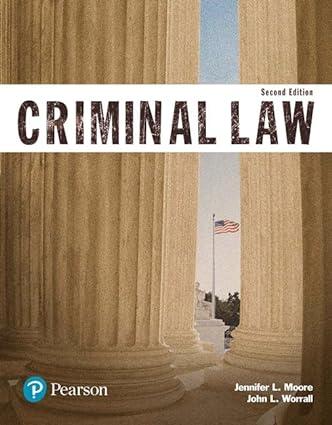After publicly burning an American flag as a means of political protest, Gregory Lee Johnson was convicted
Question:
After publicly burning an American flag as a means of political protest, Gregory Lee Johnson was convicted of desecrating a flag in violation of Texas law. This case presents the question whether his conviction is consistent with the First Amendment. We hold that it is not.
While the Republican National Convention was taking place in Dallas in 1984, respondent Johnson participated in a political demonstration dubbed the “Republican War Chest Tour”.
. . . The demonstrators marched through the Dallas streets, chanting political slogans and stopping at several corporate locations to stage “die-ins” intended to dramatize the consequences of nuclear war. On several occasions they spray-painted the walls of buildings and overturned potted plants, but Johnson himself took no part in such activities. He did, however, accept an American flag handed to him by a fellow protestor who had taken it from a flagpole outside one of the targeted buildings.
The demonstration ended in front of Dallas City Hall, where Johnson unfurled the American flag, doused it with kerosene, and set it on fire. While the flag burned, the protestors chanted: “America, the red, white, and blue, we spit on you” .
. . . Of the approximately 100 demonstrators, Johnson alone was charged with a crime. The only criminal offense with which he was charged was the desecration of a venerated object in violation of Tex.Penal Code Ann. § 42.09(a)(3) (1959). After a trial, he was convicted, sentenced to one year in prison, and fined $2,000. The Court of Appeals for the Fifth District of Texas at Dallas affirmed Johnson’s conviction, but the Texas Court of Criminal Appeals reversed, holding that the State could not, consistent with the First Amendment, punish Johnson for burning the flag in these circumstances.
. . . We must first determine whether Johnson’s burning of the flag constituted expressive conduct, permitting him to invoke the First Amendment in challenging his conviction.
If his conduct was expressive, we next decide whether the State’s regulation is related to the suppression of free expression. . . The First Amendment literally forbids the abridgment only of “speech,” but we have long recognized that its protection does not end at the spoken or written word. While we have rejected “the view that an apparently limitless variety of conduct can be labeled ‘speech’
whenever the person engaging in the conduct intends thereby to express an idea,” we have acknowledged that conduct may be “sufficiently imbued with elements of communication to fall within the scope of the First and Fourteenth Amendments.”
Johnson burned an American flag as part—indeed, as the culmination—of a political demonstration that coincided with the convening of the Republican Party and its renomination of Ronald Reagan for President. The expressive, overtly political nature of this conduct was both intentional and overwhelmingly apparent. . . In these circumstances, Johnson’s burning of the flag was conduct “sufficiently imbued with elements of communication,” to implicate the First Amendment.
Questions:
1. What crime was Johnson charged with?
2. Explain how “conduct” can be considered speech under the First Amendment?
3. What happened to the Texas Criminal Statute after the Supreme Court issued its decision?
4. What was Justice Steven’s primary argument in his dissent?
Step by Step Answer:






